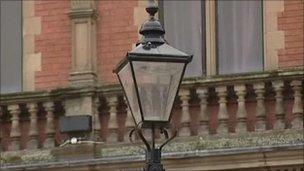Shropshire street lights 'may be turned off'
- Published

Switching off street lamps could increase the number of road casualties, Mrs Ellman said
Thousands of street lights in Shropshire could be turned off or dimmed overnight to save almost £700,000 per year.
Shropshire Council said turning down its 19,000 street lamps, illuminated signs and bollards between midnight and 0600 would reduce its electricity bill.
Trials have been proposed in Church Stretton, Ellesmere and Cleobury Mortimer.
The cabinet is due to consider the plans on 15 September.
The Commons Transport Select Committee chairwoman Louise Ellman said road safety could be compromised by turning off street lights across the country.
'Different needs'
She said: "I am extremely concerned that financial pressures are leading to steps which can jeopardise peoples lives and increase the number of injuries.
"We've made great progress in recent years in reducing the number of deaths and injuries on our roads. It would be tragic if by switching the lights off that progress was to be put back many years."
Shropshire councillor Ann Hartley, cabinet member for energy and carbon reduction, said: "It's important that we trial this with parish and town councils because different areas will have different needs, and we need to consider the safety aspect of any changes.
"For example, there will be some roads where lights need to stay on all night, and we need to consult with local councils and the emergency services about where reducing lighting will work and where it won't be appropriate."
The council said it had to reduce its carbon emissions from street lights by 35% by 2014 to meet government targets.
Andy Boddington, chairman of the Campaign to Protect Rural England, said consultation would be vital for the success of the trials.
"Given that the government is saying local communities should have more say in their futures, perhaps the decisions on turning off lights should be made by the communities affected, not Shropshire Council," he added.
- Published7 September 2010